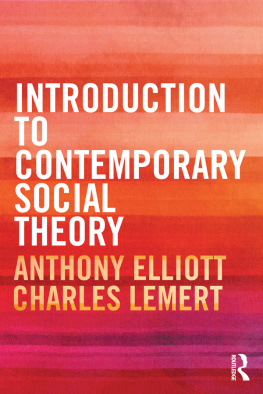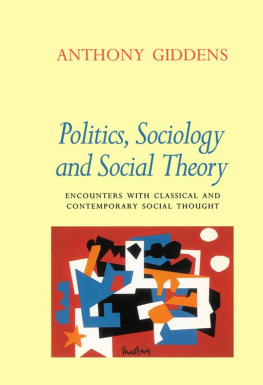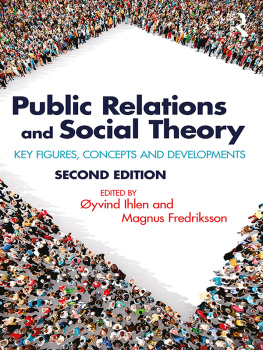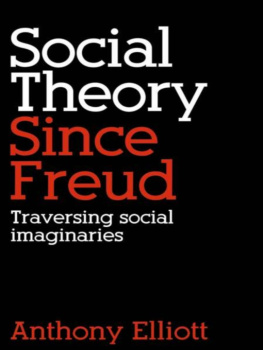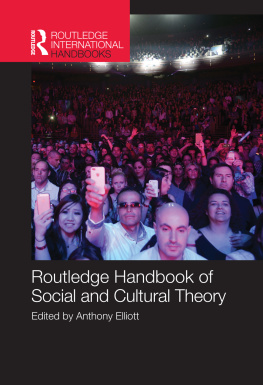Introduction to Contemporary Social Theory
In this comprehensive, stylish and accessible introduction to contemporary social theory, Anthony Elliott and Charles Lemert examine the major theoretical traditions from the Frankfurt School to globalization and beyond. The books wide range sets new standards for introductory textbooks social theorists discussed include Theodor Adorno, Herbert Marcuse, Michel Foucault, Jacques Lacan, Jacques Derrida, Anthony Giddens, Pierre Bourdieu, Julia Kristeva, Jrgen Habermas, Judith Butler, Slavoj iek, Manuel Castells, Ulrich Beck, Zygmunt Bauman, Giorgio Agamben and Manuel DeLanda.
Extensively developed to take into account significant recent developments in American social theory, the book offers chapters on American pragmatism, structural functionalism, ethnomethodology, black feminist thought and world-systems theory. American traditions of social theory are brought powerfully to life in treatments of intellectuals ranging from Charles Sanders Peirce and William James to Robert K. Merton, David Riesman to Alvin Gouldner, and Patricia Hill Collins to Charles Tilly and Immanuel Wallerstein.
Introduction to Contemporary Social Theory combines lively exposition and clarity with reflective social critique and original insights, and is a superb textbook with which to navigate the twists and turns of contemporary social theory as taught in the disciplines of sociology, politics, history, cultural studies and many more.
Anthony Elliott is Director of the Hawke Research Institute, where he is Research Professor of Sociology at the University of South Australia. His recent books include Mobile Lives (2010, with John Urry), On Society (2012, with Bryan Turner), Concepts of the Self (2013) and Reinvention (2013).
Charles Lemert is University Professor and Andrus Professor of Social Theory Emeritus, Wesleyan University; and Senior Fellow, Center for Comparative Research, Yale University. His recent books include Why Niebuhr Matters (2013), Social Theory: The Multicultural, Global, and Classical Readings (ed., 2013, fifth edition), Uncertain Worlds: World-Systems Analysis in Changing Times (with Immanuel Wallerstein and Carlos Aguirre Rojas, 2013).
Once again, Elliott and Lemert have written an exceedingly intelligent, generously interdisciplinary, and politically relevant social theory textbook. From its first story to its last question for further study, Introduction to Contemporary Social Theory is a lucid invitation to the critical study of social theory from two of the fields most eloquent and distinguished scholars.
Avery Gordon, Professor of Sociology at the University of California, Santa Barbara
Introduction to Contemporary Social Theory
Anthony Elliott and Charles Lemert

First published 2014
by Routledge
711 Third Avenue, New York, NY 10017
And by Routledge
2 Park Square, Milton Park, Abingdon, Oxon OX14 4RN
Routledge is an imprint of the Taylor & Francis Group, an informa business
2013 Anthony Elliott and Charles Lemert
The right of Anthony Elliott and Charles Lemert to be identified as authors of this work has been asserted by them in accordance with sections 77 and 78 of the Copyright, Designs and Patents Act 1988.
All rights reserved. No part of this book may be reprinted or reproduced or utilised in any form or by any electronic, mechanical, or other means, now known or hereafter invented, including photocopying and recording, or in any information storage or retrieval system, without permission in writing from the publishers.
Trademark notice: Product or corporate names may be trademarks or registered trademarks, and are used only for identification and explanation without intent to infringe.
British Library Cataloguing in Publication Data
A catalogue record for this book is available from the British Library
Library of Congress Cataloging in Publication Data
A catalog record for this book has been requested
ISBN: 9780415525725 (hbk)
ISBN: 9780415525732 (pbk)
ISBN: 9780203101865 (ebk)
For Niamh
and Julian and Caroline Lemert
There are few areas of academic inquiry as diverse, multidisciplinary and politically important as social theory. In writing this book, we have sought to develop a readable, comprehensive and critical introduction to the field of contemporary social theory. This, in itself, might be considered something of a tall order given that social theory now manages to scoop up everything from self-identity, sexuality and signifiers to gender, and governance. In seeking to provide a reasonably comprehensive account of contemporary social theory, we have tried to cover most of the major traditions of thought from the Frankfurt School to postmodernism, from structuralism to post-feminism along with overviews of many recent cutting edge developments. As such, the book includes detailed discussions of globalization and the global electronic economy, postmodernism, the rise of networks, the impacts of climate change amongst other new topics of key importance.
At the outset, this is perhaps the place to briefly comment on recent developments in social theory which have influenced the cast of this book. Social theory emerged in the context of the European Enlightenment, and has for the most part remained a largely continental affair in its traffic with fundamental questions about the social dynamics of our lives and of our lives in the age of modernity. If contemporary social theory represents, among other things, a kind of academic shorthand for the intellectual contributions of, among others, Michel Foucault, Jacques Lacan, Jacques Derrida, Julia Kristeva, Jean Baudrillard and Luce Irigaray, this says something about not only the richness, diversity and esotericism of social theory itself, but also the ambitious critique it has developed of our current ways of life. Contemporary social theory, as we argue throughout this book, is a kind of doubled enterprise: a resourceful, high-powered and interdisciplinary project of the social sciences and humanities on the one hand, and an urgent critique of ideological thought and the discourses of reason, freedom, truth, subjectivity, culture and politics on the other. At its best and our argument is that the best is to be found in the writings of Charles Sanders Pierce, Herbert Marcuse, Jrgen Habermas, Talcott Parsons, Pierre Bourdieu, Anthony Giddens, Judith Butler, Zygmunt Bauman, Immanuel Wallerstein, Giorgio Agamben, Patricia Hill Collins and Donna Haraway, among many others contemporary social theory provides a sophisticated, scintillating critique of the arrogance of power as well as engaging the future of progressive politics.
We should like to thank various people and institutions that have assisted in the preparation of, or otherwise influenced, this book. Gerhard Boomgaarden at Routledge has played a critical role in shaping this book and we are grateful for the many ways in which he has assisted in its preparation. It was his idea to build upon an earlier edition of this book written by Anthony Elliott, and for Elliott to work (once again) with Charles Lemert for an edition that included alongside the European theorists representatives of the long and strong American expressions of social theory. This work represents the latest of a good many collaborations going back, now, over a good decade of growing common interests and friendship that, the oddity of our age differences aside, seems more as if it has always been there.
Much of the writing and preparation of the book was undertaken at the Hawke Research Institute at the University of South Australia. Eric Hsu, project manager of the second edition, assisted us throughout with admirable efficiency. We are very grateful for his labours and dedication. We should also like to thank Adam Henderson and Dan Torode for their splendidly scrupulous research and editing of the manuscript. Also at the Hawke we would like to thank: Jennifer Rutherford, David Radford, Daniel Chaffee, Maureen Cotton, Phoebe Smith and Lynette Copus. Finally, at Routledge, I would like to thank Emily Briggs. For better or worse, Charles Lemert did all his writing pretty much on his own in New Haven, where he enjoyed the stimulation of Yale students and faculty nearly as much as the long stretches of solitude that led to his rereading and meditation on American thinkers he has known, one way or another, over his adult life.
Next page
